Words Matter - How To Engage In Meanful Conversation When Talking About Controversial Topics
The tools of communication: words, attitude, and your clarity of purpose.
The same data can be interpreted very differently depending on who's doing the interpretation.
What this means, what this says to me in many cases: "It is often less about the data than the narrative." We all have our perceptions of the world, how it works, and we look at the data through those perceptions, and this shapes our interpretation.
This is a fundamental thing to understand as you communicate with friends, colleagues, others about controversial topics such as climate change.
I mentioned words. Words matter. Words set the tone, words convey your opinion of something, they put the audience, the person you're speaking to in a certain posture to receive your message or to resist your message. I'm going to give you just a few examples.
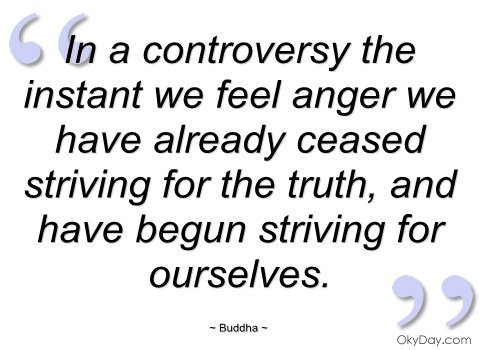
Estate tax. A tax on the wealth you leave behind after you die, that is one way of describing it.
Others choose to describe this as the death tax, the final kick in the pants by the U.S. government as you head to your grave.
Words matter.
Stand-your-ground law. To some, this is the right to not have to retreat when you feel threatened and actually fight back with deadly force, even if you could retreat.
To others, this is a license to kill. Why not retreat when you can? Why stay and kill someone?
Words matter. The same situations, but cast very, very differently.
Here are just a few other examples: job-killing taxes versus revenue for national needs; affordable health care, Obama care; government intervention, the common good.
Different ways of describing the same phenomena, but the words say something about how you feel, and depending on which of these words you use when you talk to someone, you'll elicit a certain kind of posture, a certain kind of response.
Attitude matters. People react much more to your attitude than to what you say. Pay attention to how you make them feel.
This is what your attitude does, it sets the mood of a conversation. It will either put people in a resistive posture if you're forthcoming, if you're strong, you're coming at them with both barrels, or, perhaps, a more receptive posture, if you're a little more open if you're a little more receiving.
The third is your purpose, or more specifically, clarity of purpose. You need to be clear on your goals. What is the purpose of your conversation?
To some people it's just about convincing, it's just about winning. When I talk to people, my interest is not so much about getting a certain outcome, I'm not a lobbyist; my interest is getting them to think differently than, perhaps, they have. And getting myself to think differently than, perhaps, I have. It's a two-way--, it's engagement, it's not talking at someone, it's engaging someone, to move people, to move the conversation forward.
So my sort of rules of engagement, I have four. The first is understand the context.
I like to say your adversaries are not as dumb as you want them to be. Think about that!
How many times have we all done it: "Oh, it's just so stupid! Why are you so stupid? If you could just see things the way I see them. If you knew what I knew, you'd see things my way."
People feel the way they feel because of their values. It's usually not just that they're dumb, it's just that they view things differently than you do. Once you do that, you can frame your ideas in ways that resonate, in ways that connect with people, meet them where they are.
Don't tell people what to think. Understand those beliefs are rooted in values, so when you tell people what to think, you're directly challenging their values.
And the third - if you take one thing away from this, please, let it be this - don't expect your values to change other people's beliefs.
If you're going into a conversation thinking that because I value this, I can convince this person of the same thing I think, you're not going to have a constructive conversation.
So understand the context, frame ideas in ways that resonate, don't tell people what to think, and don't expect your values to change other people's beliefs.
When I put this into practice, when I have a conversation with a person about climate change, to get at that, I like to do two things. The first is I like to speak in simple, logical, intuitive statements. So I'll use something that we can both agree on as a starting point.
In the area of climate change, it's this: "If we put heat-trapping gas into the atmosphere, it will trap heat." You don't have to be a genius to understand this statement.
Most people can get that far in the conversation. I'm not thinking about the outcomes, let's start at the beginning. You can argue about how much heat and what's too much, what's not, - well, never not enough - but what's too much, what is tolerable.
But the basic principle: heat-trapping gas will trap heat.
The other is we all share some common core principles. We all want to be safe. We all value freedom. We all want opportunities to prosper. These are the common principles, whether I'm talking to a Republican, a Democratic, Tea Party, independent, whatever. Those are things we all value.
Some of us are willing to give up more of one to gain another, others the opposite, but when we start in that place, we can have a meaningful conversation, no matter how far apart we may seem to be.
This is a graph of the Dow Jones Industrial for the last 110 years, the stock market, the Dow Jones Industrial Average. It may not have much on its face to do with climate in the way you look at it, but, in fact, it does.
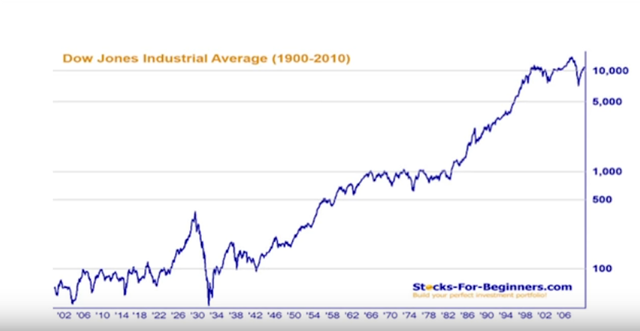
If you look at his curve, - it's on a logarithmic scale, so it's a bit compressed - but if you look at this curve, you see that it goes up, it goes down; in general, it goes up over the long period, over the full period of the cycle, and over the last decade or two, it has actually leveled off quite a bit.
If you look at the climate curve, the temperature curve, for the last 150 years, it goes up, it goes down, on balance, goes up quite a bit, it has leveled off some over the last decade.
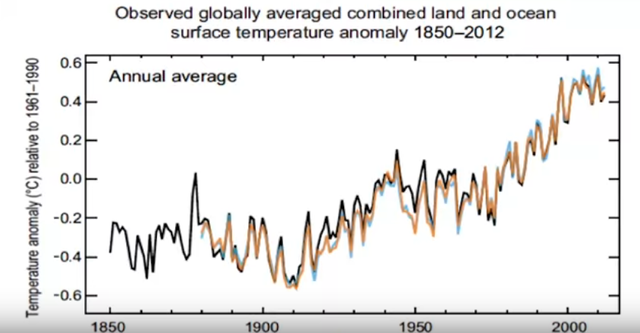
I use this analogy because, you know, everybody wants stocks to go up, everybody can look at the graph of the stock and get a sense of what it's doing.
When we do this in the context of temperature, I'll bring it back to stocks. You would never look at one stock, you'd never look at one short period of time to understand the trend. If you took a five-year snapshot of anywhere on here, you might see rapid raises, rapid declines, you'd never say this is what is telling us what the markets are doing in the long term; no, you'll look at a longer data set.
The same is true with temperature. Similarly, the leveling off at the top, the basic principles of economics and investment, the odds are the market is going to continue to go up.
You can't look at that leveling and say: "The graph has stopped, the market is coming down, it's going to go back to what it was in 1902." You'd never do that.
The other thing is you'd never look at one stock or a handful of stocks - they're climbing, increasing, whatever, - and say: "This is what the market is doing."
You want an index, a representative index, you want SND 500, you want 500 stocks, you want to collect enough data to make meaningful contributions. Yet, people do this with temperature all the time. People will grab a small snapshot. This last summer, Tyler, Texas, and Lubbock, Texas had a record-low high temperature in July.
So it was the lowest high temperature in July, I think it was 77 degrees, and people took that and said: "Wow, it's done! There is your climate warming, it's done." You can't do that. Nor can take an extremely hot year and say: "Oh, we're cooking. This is what it's going to be like from here on now." You don't pick narrow time frames, and you don't pick one place.
There are places on the Earth that are cooling, many places on the Earth that are cooling. That does not tell us what the Earth is doing as a whole, a collection of the data tell us that.
One more analogy to the stock market. This is a reconstruction of temperature histories for the last 1,000 years, the famous Hockey Stick, it's called.
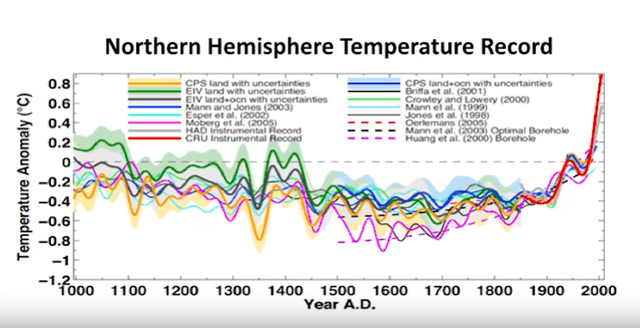
If these were stocks, - these are different reconstructions, this is what different people find - if these were stocks or a stock history of a company, you'd look at about 1850, 1900 and say: "Wow, something happened there. What did they do? Did they change the management? Did they introduce a new product? Did they realize some efficiencies?" You'd want to know, you'd dig into it, but you'd say there was a change there.
If this were money, you would say there was a change there, or if this were the value of a stock. The same is true with temperature. There was a change there, something happened in the period of the Industrial Revolution.
By drawing the analogy to the stock, I'm sort of taking it out of the controversial realm and saying: "Let's just look at data, forget our ideologies. What do the data say?" When looking at it in that context, you look at it differently.
You look at it and ask different kinds of questions. So these are climate model predictions for the future. What you see in gray is the past, what our models say happened before, so you get a sense of how good or bad they are by the uncertainty, the width of that gray band.
In the future, we see different scenarios. One, a leveling off of temperature, that is if we drastically reduce greenhouse gas emissions; the other, the red at the top, is 'business as usual' as we call it, if we don't make any changes and just continue with our activities unabated.
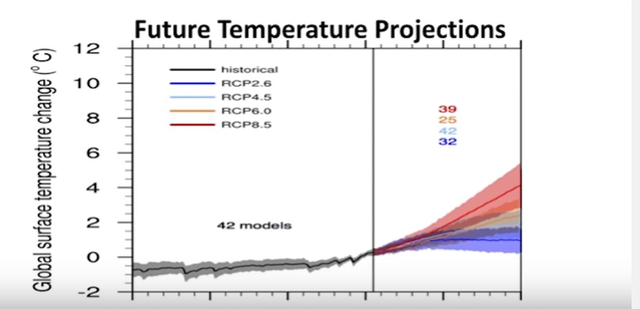
There is a range of futures out there. This is what the basic physics tell us. Now, we can have a conversation about our differing values and how we should address this, but the basic physics, the basic principles tell us this.
So I come back to the Earth.
A lot of you look at it up close and personally, that is great too, but I come back to the Earth. I'm not going to sit here and say: "You will experience drought. You will experience flooding. Where you live is going to go up 2 degrees, where you live is going to go up 4 degrees." I can't really say that, and I don't think that's the right conversation to have.
I think the right conversation to have is we are stressing the planet, we are putting heat-trapping gas into the atmosphere. it is trapping heat, that causes temperatures to rise, and that puts us in a different kind of risk posture for the future, a higher risk posture.
How do we address that? Is the cost of not doing anything greater than the cost of doing things? That is the kind of conversation you got to have, and if I come at you with: "The world is getting warmer, it's going to be anarchy," many people will shut down.
The people that won't, are those that already believe it, and I don't need to have that conversation. We're stressing the planet. And that puts our future in a very uncertain state.
This doesn't have to be a story though about bad news, about repression, or suppression. If we look at the challenge of climate change, I think it can actually be a different kind of story. A story about national security, a story about energy independence, a story about prosperity, a story about giving to our future generations. And when cast in that context, sure, these challenge the current structures, but these are the kinds of things that people value, these are the kinds of topics we can have conversations around.
And I encourage you, as you talk about anything controversial, think of your narrative, think of the other person's narrative, think about how you can frame the discussion in ways that resonate with people, in ways that connect with people.
Finally, I want to leave you with this last thought. One person's sunset is another person's sunrise. It's really a matter of your perspective, how you view things, where you sit when you look at the phenomena. So, as you go out and as you communicate, I encourage you all to avoid the sunset and seek the sunrise.
References
https://en.wikiquote.org/wiki/Maya_Angelou
http://icwdm.org/handbook/carnivor/Coyotes.asp

Good post. Rather than linchpin social change on "man made global warming!" as it had previously been hyped up, now it climate change. I agree on the data, it's troubling.
There are other reasons to stop doing what we do, not just climate data that is impacted by human behavior, but not be totally caused by human behavior. The sun and it's influence adds more data to not blame humanity is how I understand it. And I know the "hidden hand" globalists are afoot with their subterfuge and carbon taxation, etc. It's a law that makes something illegal secretly, so we are fined for using it constantly since it' used so much lol.
I don't think humans are the only cause for climate change and the carbon tax seems like another way to control the masses. Every living thing on the planet is carbon-based. Taxing people for creating carbon is not going to solve anything.
Thanks for reading my post. Much appreciated.
Great post
Thanks for stopping by and reading my post.
This. I needed to read. I'm glad I did. Thank yous @luzcypher.
While choosing the words is important, i think having the right tone of delivery is also something to consider.
Exactly, attitude conveys as much information as the words themselves.